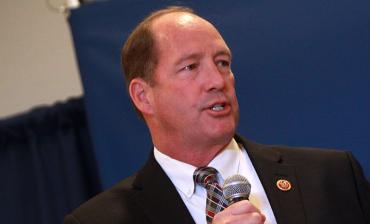
This week, a North Florida Republican’s proposal to reform foreign aid. which has the support of the White House. picked up steam on Capitol Hill.
U.S. Rep. Ted Yoho, R-Fla., the chairman of the U.S. House Asia and Pacific Subcommittee, is the House sponsor of a major reform of how the federal government manages international development finances. Earlier this year, “Better Utilization of Investments Leading to Development Act (BUILD Act)” which streamlines a host of federal programs into a single development finance corporation. The Trump administration made a similar proposal in its FY 2019 budget request and is currently backing Yoho’s proposal.
Yoho made the case for his proposal at the end of February when he unveiled his legislation.
“U.S. foreign aid and development money, when properly implemented, are strong tools of diplomacy,” Yoho said. “When used effectively, these funds help improve our diplomatic, economic, and national security interests around the globe. Today’s introduction of the bipartisan BUILD Act will reform and modernize America’s approach to development finance making it more efficient and effective.
“Right now we have multiple federal agencies distributing foreign aid around the globe. The BUILD Act will consolidate various federal development programs and agencies into one full-service, self-sustaining U.S. International Development Finance Corporation (IDFC). By streamlining our current system, we will not only spark economic growth in developing countries; we will improve America’s global competitiveness,” Yoho continued.
“Taking countries from aid to trade is the end goal,” Yoho added. “We want to help countries become robust trading partners with the United States. By doing so, we will be helping create stable, self-sufficient societies around the world and open new markets for U.S. goods and services. There is truth to the saying a rising tide lifts all boats. The BUILD Act will help make this a reality.”
Yoho has reeled in U.S. Rep. Adam Smith, D-Wash., as a cosponsor. The bill was sent to the House Foreign Affairs Committee which examined it earlier this week.
On Wednesday, after the committee gave its full attention to the bill, Yoho thanked U.S. Rep. Ed Royce, R-Calif., and the Trump administration.
“I would like to thank House Foreign Affairs Committee Chairman Ed Royce for his support of the BUILD Act and for convening the full committee hearing today,” Yoho said. “Creating a modern development finance system that focuses on efficiency and oversight, benefits our national security and the emerging markets that receive U.S. foreign aid dollars. For the countries receiving development finance, the goal is to transition them from aid recipients to trading partners.
“The BUILD Act will streamline our current system and the method by which we target our foreign aid investments,” Yoho added. “I would also like to thank the administration for their support for this bipartisan bill. Working together to pass the BUILD Act, not as Democrats or Republicans but as Americans, will strengthen U.S. foreign assistance and make us more competitive around the world."
Over in the Senate, Foreign Relations Committee Chairman Bob Corker, R-Tenn., and U.S. Sen. Chris Coons, D-Del., introduced a similar proposal earlier this year. Corker’s office insisted the new development finance corporation “will leverage the U.S. private sector’s expertise and investment capital to generate economic growth in the developing world that will support American interests.”
“Taking a free-market approach to development finance will provide more accountability for taxpayers at no expected cost, create new opportunities for U.S. businesses to invest overseas, and expand American influence around the world,” said Corker. “The president embraced this concept in his budget because sustainable growth in the developing world promotes U.S. interests in security and stability while expanding markets for American companies. I am proud to join Senator Coons in this effort and look forward to working with my colleagues to make it a reality.”
“The bipartisan BUILD Act will create a 21st century development finance institution with the full suite of tools to attract private sector investment to low income countries,” said Coons. “This new institution will make targeted investments to reduce poverty in countries that are critical to our national security. I look forward to working with my cosponsors to pass a strong bill that helps make markets work throughout the developing world.”
The proposed U.S. International Development Finance Corporation (IDFC) will take over efforts currently scattered in a host of federal offices including the Overseas Private Investment Corporation (OPIC), USAID’s Development Credit Authority, USAID’s Enterprise Funds and USAID’s Office of Private Capital and Microenterprise.
“The IDFC will operate in low and lower middle-income countries where it furthers the U.S. national security and economic interests and where the project can be shown to have a demonstrable development outcome. Congress will maintain oversight of the IDFC by reviewing the agency’s public reports on its development impact and through independent audits and the establishment of an inspector general in the corporation,” Corker’s office noted. “The IDFC will have the authority to: issue direct loans, including local currency loans; issue guaranties, including local currency guaranties; provide political risk insurance; fund first losses; participate in equity investments; provide technical assistance; make limited grants to unlock larger investments; and attract private sector talent.”


